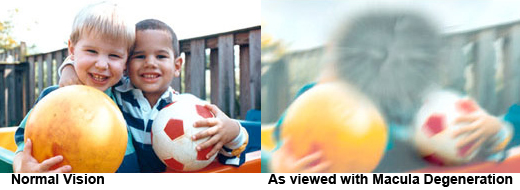Age related macular degeneration (AMD) is the leading cause of vision loss in North America. AMD is a condition that causes damage to the macula, resulting in loss of sharp, straight-ahead vision. As the disease progresses, the center of ones vision develops blurred spots. These spots tend to grow larger with time, interrupting the ability to perform daily tasks such as driving, reading, cleaning, and watching TV.
Vision loss resulting from AMD is strongly correlated with the development of depression. Researchers explain that the correlation between AMD and depression is due to changes in the patient’s behavioral patters. Such changes include choosing to stay at home instead of visiting with friends or going out to explore new places. Activities which used to produce pleasure and stimulation, or a sense of independence, slowly cease to happen. These behaviors increase feelings of isolation and loneliness, which can lead to symptoms of depression.
Medical specialists are currently refining treatment methods to negate the negative experiences caused by AMD. Researchers are working on a form of rehabilitation known as Behavior Activation. This approach combines weekly meetings with specialized occupational therapists (trained to work with people experiencing vision loss), the use of low vision devices, and working towards personal goals in manageable steps.
Behavior activation is intended to keep people doing the things they enjoy, and to help them recognize that stopping these activities can negatively impact their mental health. Behavior activation therapy includes educating people on the use of low vision devices, making changes around the house (using brighter lights, reducing tripping hazards), encouraging the upkeep of social activities, and aiding in the overall upkeep of ones quality of life.
By increasing the relationship between primary eye care specialists and mental health care workers, the healthcare system continues to become better equipped to treat the whole person, rather than just fragments. If you have AMD, educate yourself on the services available, and use them. If you know someone with AMD, be aware of sudden mood or behavior changes.
http://www.nei.nih.gov/news/pressreleases/070914.asp
http://www.geteyesmart.org/eyesmart/diseases/low-vision-aids-rehabilitation.cfm



